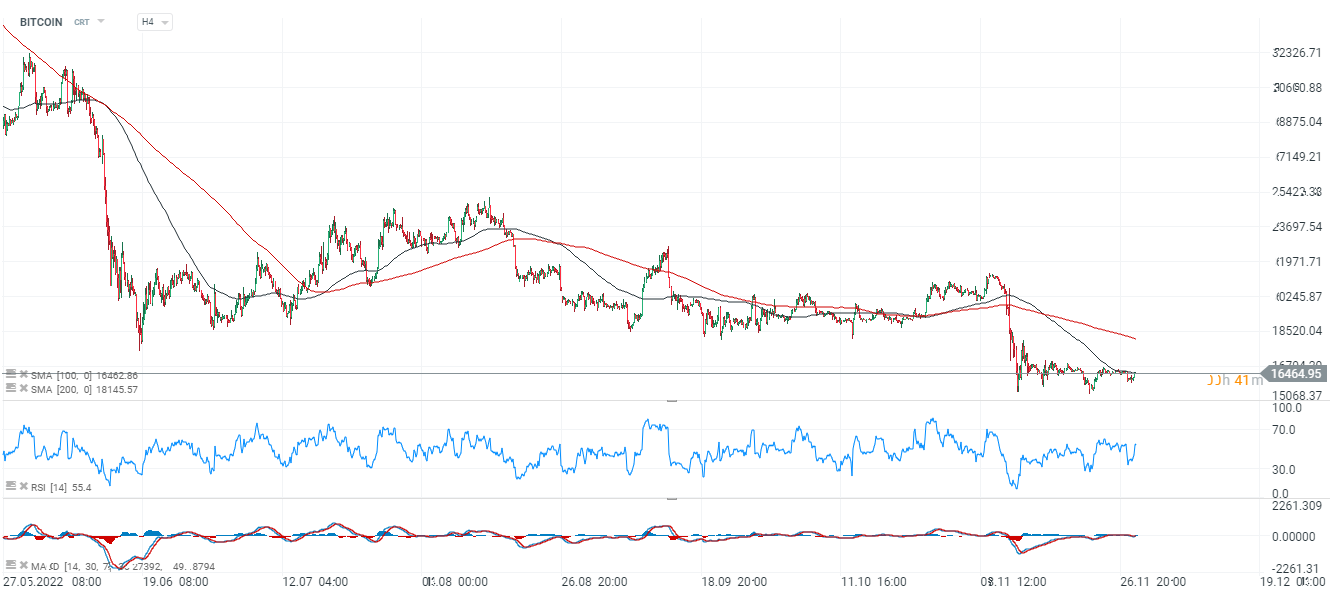Cryptocurrencies are trying to unwind the declines of recent days. Bitcoin's support at $16,000 has held up and today the bulls are taking the price of the major cryptocurrency higher, near $16,500 where a key supply and demand zone is located in the short term.
- ECB President Christine Lagarde, at a hearing of the European Parliament's Economic and Monetary Affairs Committee, again called for work on MiCA II regulations in the face of the FTX collapse, calling the matter an 'absolute necessity' for the EU. Lagarde had already hinted at the urgent need to regulate so-called staking and cryptocurrency lending earlier in June;
- Cryptocurrency bank Silvergate conveyed that its exposure to deposits of digital assets of the collapsed BlockFi exchange is less than $20 million. Yesterday, the bank's stock scored double-digit declines amid news that BlockFi had filed for bankruptcy. The institution dismissed the speculation and indicated that it has no investments linked to the bankrupt entity;
- The U.S. Treasury Department's Office of Foreign Assets Control has reached a settlement with cryptocurrency exchange Kraken over customer service in Iran. The exchange agreed to pay a substantial sum to settle its potential civil liability for violating sanctions against Iran. It also agreed to invest $100,000 to implement additional controls for compliance with US sanctions.
 Nearly 60% of cryptocurrency funds operate in the United States (419) by what will ultimately be the most significant regulations in the US for the industry. Venture capital funding of new cryptocurrency projects fell by half in the previous month. Combined assets under management (AUM) in the US, UK and China exceed $500 billion and are likely to be a driver in further shaping the market. Source: Cointelegraph Research
Nearly 60% of cryptocurrency funds operate in the United States (419) by what will ultimately be the most significant regulations in the US for the industry. Venture capital funding of new cryptocurrency projects fell by half in the previous month. Combined assets under management (AUM) in the US, UK and China exceed $500 billion and are likely to be a driver in further shaping the market. Source: Cointelegraph Research
- Investment in cryptocurrency funds still dominated by the United States. The majority of companies investing in cryptocurrencies are venture capital funds (52.8%), hedge funds (44.3%) and private equity and mutual funds (2.9%)
What about regulation?
- Israeli Finance Minister Avigdor Lieberman praised economist Shira Greenberg for her work, stating that the report she created "will serve as the basis for future decisions and regulations" in the coming months. Shira Greenberg, one of Isreel's chief economists, presented her recommendations, indicating that the Israel Securities Authority should retain more authority to oversee the industry;
- In a special report, Greenberg outlined a list of regulations that could safely drive cryptocurrency adoption. Among them are stricter requirements for obtaining licenses and trading platforms, and securing the management of digital asset funds. In terms of legislation, Greenberg mentioned the need to implement special oversight rules for issuers of so-called stablecoin, along with the proposed establishment of a commission to investigate and regulate decentralized blockchain-based autonomous organizations known as DAOs;
- The Tel Aviv Stock Exchange (TASE) on Oct. 24 announced the creation of a platform to extend trading services to cryptocurrencies. Testing of a pilot project involving tokenization of digital bonds is expected to end in Q1 2023; Tel Aviv Stock Exchange (TASE) Oct. 24 that it intends to expand its trading services to cryptocurrencies. TASE has also begun testing a project involving tokenization of digital bonds, which is expected to be completed in Q1 2023. So far, cryptocurrency adoption in Israel has not been rapid, with residents of the country accounting for 21 million blockchain transactions this year, representing 0.04% of all transactions worldwide. One in 50 Israelis indicated that they have a cryptocurrency wallet.
- ECB President Lagarde stressed that the FTX bankruptcy was about the stability and reliability of the exchange. The ECB would have to step in as a global regulator to address the growing worldwide interest in cryptocurrencies: "(...) as I said earlier, this is one step in the right direction. It's not - there will have to be a MiCA II, which will cover more broadly all that it aims to regulate and supervise, and that is badly needed." All indications are that regulation of the industry will take years.
- The Markets in Crypto Assets (MiCA) bill is awaiting approval after legal and language checks by EU lawmakers. The European Parliament's economic committee approved MiCA in October after trilateral negotiations between the EU Council, the European Commission and the European Parliament. The policy could take effect from 2024. Lagarde supports the idea of additional MiCA II regulations to help regulate cryptocurrency staking and lending.
- Stefan Berger, a member of the European Parliament's economic committee, a MiCA supporter, commented on the FTX collapse: "The case clearly shows the dangers of a completely unregulated cryptocurrency market and unlicensed cryptocurrency exchanges. We still have a large number of cryptocurrency asset service providers whose concept is not understood. MiCA solves exactly this problem. With a global MiCA, the FTX crash would not have happened." The ECB is currently conducting a two-year research phase of its digital euro project. Some EU officials expect the first legislative solutions as early as 2023.
 Bitcoin, H4 interval. Bitcoin price has reached the 100-session average again (black color) where bulls will want to test the strength of supply. If short-term resistance can be overcome, the nearest support could be the 200-session average (red), which runs around $18,000. Source: xStation5
Bitcoin, H4 interval. Bitcoin price has reached the 100-session average again (black color) where bulls will want to test the strength of supply. If short-term resistance can be overcome, the nearest support could be the 200-session average (red), which runs around $18,000. Source: xStation5

Daily summary: Weak US data drags markets down, precious metals under pressure again!

🚨 Bitcoin drops to $69,000 📉 A 1:1 correction scenario?

Market wrap: Novo Nordisk jumps more than 7% 🚀

Crypto news: Bitcoin falls below $70k 📉Will crypto slide again?


